Carson and Colorado Railway
The Carson and Colorado Railway was a U.S. 3 ft (914 mm) narrow gauge railroad that ran from Mound House, Nevada, to Keeler, California below the Cerro Gordo Mines. It was incorporated on May 10, 1880 as the Carson and Colorado Railroad, and construction on the railroad began on May 31, 1880. The 3 ft (914 mm) narrow gauge track was chosen to reduce cost. Much of the route now parallels U.S. Route 95 Alternate, U.S. Route 95, Nevada State Route 360 and U.S. Route 6
| Overview | |
|---|---|
| Locale | California and Nevada |
| Dates of operation | 1880–1960 |
| Successor | Southern Pacific Company |
| Technical | |
| Track gauge | 3 ft (914 mm) |
| Length | c. 300 miles (480 km) |
The Carson and Colorado began operations with a single Baldwin 4-4-0, the Candelaria. The first train arrived at Keeler on August 1, 1883. The 300-mile (480 km) route reached an altitude of 7,100 feet (2,200 m) in Montgomery Pass.[1] The railroad served an arid area heavily dependent on mineral resources for economic activity. The line was reorganized as the Carson and Colorado Railway in 1892 to reduce accumulated debt.[2]
Sale to the Southern Pacific
From its inception, the Carson and Colorado was a hindrance to the Virginia and Truckee Railroad (V&T), the parent company of the C&C, who sold the line to the Southern Pacific Company in 1900. Darius Ogden Mills (part owner) was once quoted saying "Either we built the line 300 miles too long, or 300 years too early!" Silver and gold discoveries at Tonopah, Nevada and Goldfield, Nevada provided a major boost of revenues shortly after the Southern Pacific purchase.[2] From the time of the purchase until 1905, all of the C&C’s freight traveled over the V&T's trackage from Mound House to Reno, and vice versa. Because of the changeover from 3-foot (0.91 m) narrow gauge to standard gauge cars, all the freight had to be handled by hand at Mound House, which caused a great bottleneck, especially after the mining booms of Tonopah and Goldfield. Southern Pacific (SP) proffered an offer to purchase the V&T, but the price was placed too high. As a result, the SP began constructing the Hazen cutoff, which circumvented the V&T entirely after it opened. The northern 140 miles (230 km) from Mound House to Mina, Nevada was converted to 4 ft 8 1⁄2 in (1,435 mm) standard gauge in 1905; and the remaining C&C was merged into the Southern Pacific's 3 ft (914 mm) narrow gauge subsidiary, the Nevada and California Railroad.[3] The Nevada and California Railroad was reorganized into the Central Pacific Railroad in 1912.[3] In the early 20th century, it operated under the name "Southern Pacific Keeler Branch". Portions of the line were abandoned in the 1930s and the 1940s, and the last narrow gauge common carrier made its final run on April 29, 1960.[4] The rails were removed in January, 1961.
The former parent company, Virginia and Truckee Railroad, has been reconstructed from Virginia City to a station in Mound House, which replaced the former original station. Passenger (tourist) service has been restored along much of the original V&T right of way, with investigations into returning service to Carson City again in the future.
Locomotives
Towns and railroad stations served by the C&C
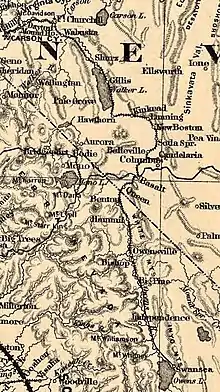
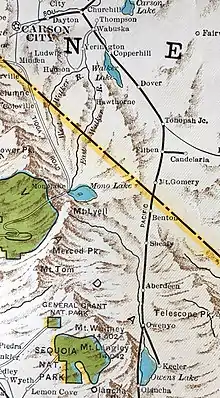
- Mound House, Nevada (V&T Railroad to Carson City and Virginia City)
- Dayton, Nevada
- Fort Churchill, Nevada
- Wabuska, Nevada (Copper Belt Railway to Yerington)
- Lux, Nevada
- Moquist, Nevada
- Rio Vista, Nevada
- Schurz, Nevada
- Stuckey, Nevada
- Copperhill, Nevada
- Gillis, Nevada
- Rand, Nevada
- Magnus, Nevada
- Walker, Nevada
- Thorne, Nevada
- Hawthorne, Nevada (branch to Cottonwood)
- Cottonwood, Nevada (branch only)
- Kinkead, Nevada
- Luning, Nevada
- New Boston, Nevada
- Mina, Nevada
- Sodaville, Nevada (Soda Springs)
- Rhodes, Nevada
- Tonopah Junction, Nevada (Tonopah and Goldfield Railroad)
- Belleville, Nevada
- Filben, Nevada (spur to Candelaria)[6]
- Candelaria, Nevada (spur only)
- Basalt, Nevada
- Summit, Nevada (Mt. Montgomery)
- Queen, Nevada
- Benton, California
- Hammill, California
- Laws, California, Owensville
- Zurich, California
- Monola, California (formerly Alvord)
- Kearsarge, California
- Manzanar, California
- Owenyo, California (Southern Pacific Railroad to Lone Pine, Ridgecrest, and Los Angeles)
- Alico, California
- Dolomite, California
- Mock, California
- Swansea, California
- Keeler, California[6][7]
Restoration effort
In Independence, California, a non-profit group re-incorporated the Carson and Colorado Railway. They have restored locomotive #18, which was left in Independence in excellent condition by the Southern Pacific in 1955. The locomotive moved under its own power for the first time in 62 years on Saturday October 15, 2016. The locomotive is currently housed in a two stall engine house at the Eastern California Museum in Independence, CA. There is close to 1000 feet of track for it to operate on. Former SP boxcars #1C and #15 are on rail with engine #18 as part of the exhibit.[8]
Gallery of C&C equipment
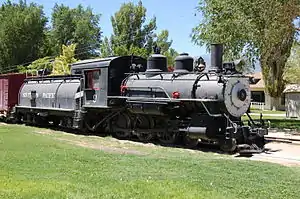 The second engine #9, painted in Southern Pacific livery, currently located at the Laws Railroad Museum in Laws, California.
The second engine #9, painted in Southern Pacific livery, currently located at the Laws Railroad Museum in Laws, California.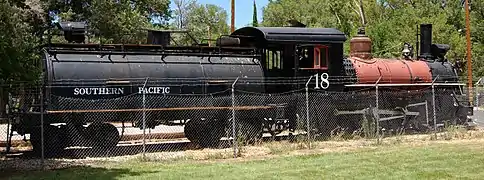 The engine #18, painted in Southern Pacific livery, currently located in Independence, California. Restored and Operable.
The engine #18, painted in Southern Pacific livery, currently located in Independence, California. Restored and Operable.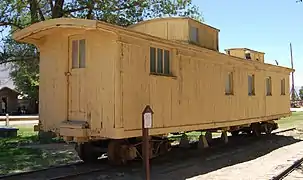 Carson & Colorado Caboose #1, currently located at the Laws Railroad Museum in Laws, California.
Carson & Colorado Caboose #1, currently located at the Laws Railroad Museum in Laws, California.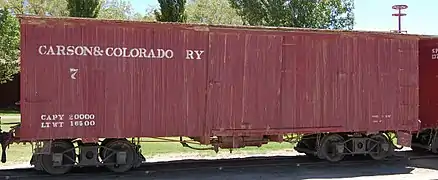 Carson & Colorado boxcar #7, currently located at the Laws Railroad Museum in Laws, California.
Carson & Colorado boxcar #7, currently located at the Laws Railroad Museum in Laws, California.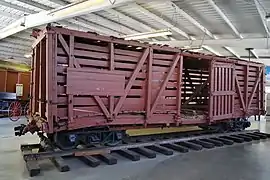 Live stock car #163, currently located at the Travel Town Museum in Los Angeles, California.
Live stock car #163, currently located at the Travel Town Museum in Los Angeles, California.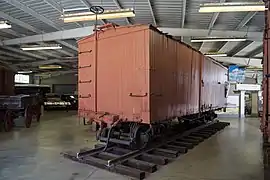 Carter Brothers box car #1, currently located at the Travel Town Museum in Los Angeles, California.
Carter Brothers box car #1, currently located at the Travel Town Museum in Los Angeles, California.
References
- Turner 1974 p.2
- Turner 1974 p.4
- Turner 1974 p.6
- Likes 1975 p.83
- "Locomotive Notes",Trains and Travel magazine, November 1952
- "Carson and Colorado Route Map". Historical Society of Dayton Valley (Nevada). Retrieved 10 December 2020.
- "Southern Pacific Narrow Gauge, officially known as the Keeler Branch". Occidental College. Retrieved 10 December 2020 – via Callimachus.
- "Carson & Colorado Railway". Carson & Colorado Railway. Retrieved 22 September 2017.
Sources
- Guide to the Carson & Colorado Railroad Company records, 1881–1901, at The Bancroft Library
- A Guide to the Carson and Colorado Railroad Records, NC71. Special Collections, University Libraries, University of Nevada, Reno.